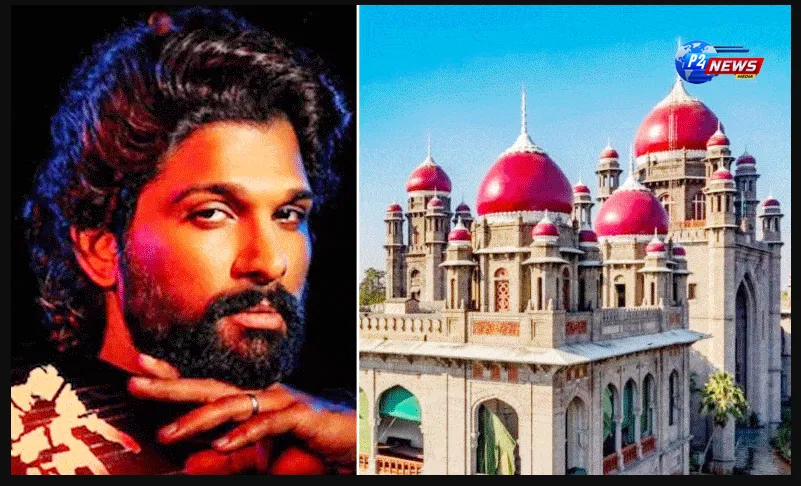On December 13, the Telangana High Court granted actor Allu Arjun a four-week interim bail while he seeks to quash an FIR related to a stampede outside a Hyderabad cinema. The incident occurred during an unexpected visit by the actor, resulting in one fatality.
The Telangana High Court has granted a four-week interim bail to actor Allu Arjun as of December 13, following his plea to quash an FIR related to a tragic incident that transpired outside a cinema in Hyderabad. This unfortunate event occurred during an unplanned visit by the actor, resulting in a stampede that led to the death of a woman.
After an extensive two-hour hearing, Justice Juvvadi Sridevi indicated a favorable inclination towards granting interim bail, referencing precedents such as the Arnab Goswami case. The judge emphasized the necessity for the actor to provide bonds to the Jail superintendent due to his prior arrest.
During the proceedings, the bench expressed concern regarding the handling of the matter, questioning whether the presence of an actor should result in such legal repercussions. Justice Sridevi remarked, "It’s rather troubling. Can one be held under such restrictions merely for being in the public eye? The right to life and liberty is fundamental and cannot simply be revoked due to an individual’s profession."
Earlier in the day, a lunch motion was presented by the actor's counsel before Justice Sridevi, which was subsequently approved. Initially, the public prosecutor representing the state argued against granting any relief to the actor, highlighting that seven individuals had already been arrested in connection with the incident while requesting additional time to file a formal response.
When the case was reviewed later in the afternoon, senior counsel S. Niranjan Reddy, representing Allu Arjun, articulated that to establish culpable homicide, there has to be clear intent—a requirement he believed was unsubstantiated in this case. During this time, the actor was presented before a magistrate court, where he was remanded to judicial custody for a period of fourteen days.
Reddy pointed out inconsistencies within the FIR's claims, questioning whether Allu Arjun had any knowledge that a fatal incident might occur. He further compared the situation to a previous incident involving actor Shahrukh Khan, who faced similar circumstances during a promotional event. In that scenario, the court ruled that the actor was not criminally liable, despite the chaotic conditions created by his actions.
The counsel asserted that the incident occurred on the ground floor while the actor was situated on a higher floor, emphasizing that communication was established prior to the event regarding the actor’s visit. He contested allegations against his client, stating that both the actor and the film’s producer had notified the venue about the expected attendance.
Citing sections of relevant law, Reddy argued that the charges under Section 118 concerning the use of dangerous weapons were not applicable, which was compounded by the suggestion that the maximum punishment for negligence would be five years. He referenced the Arnesh Kumar case to reinforce that arrests should not occur without prior notice to the individual involved. Reddy emphasized the uncontrollable nature of tragic incidents and likened the circumstances to political rallies where similar unfortunate events could arise.
In response to the public prosecutor’s arguments, the court highlighted the absence of evidence supporting the claim that the actor's actions directly caused the stampede. The discussion led to further scrutiny over the allegations being made and whether they truly warranted the denial of bail for Allu Arjun.
The public prosecutor contended that the actor’s choice to attend the event amidst a large crowd constituted a conscious decision that led to the chaotic outcome. In contrast, the defense maintained that negligence does not equate to culpable homicide and pointed out that even in a case of negligence, custodial detention may be excessive.
Both parties presented their arguments extensively as the court deliberated on whether the ingredients constituting the charges were indeed present. Eventually, Justice Sridevi expressed concern about the implications of depriving the actor of his liberty based solely on his status as a public figure, highlighting the necessity for a thorough examination of the evidence before proceeding with such drastic measures.
As the session progressed, the public prosecutor requested more time to compile facts pertinent to the case, while the defense insisted that immediate bail was justified given the arguments presented. The ongoing discourse indicated a complex legal situation with potential implications for the interpretation of law in similar cases involving public figures.
Ultimately, the high court sought to balance the severity of the allegations against the fundamental rights of the accused, ensuring that justice remained the priority in its deliberations.
















Comments 0